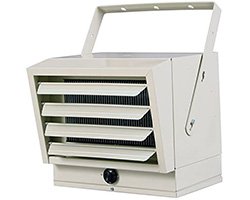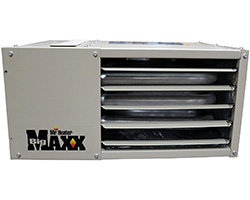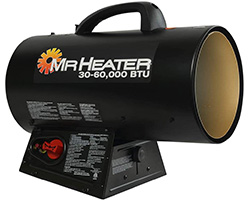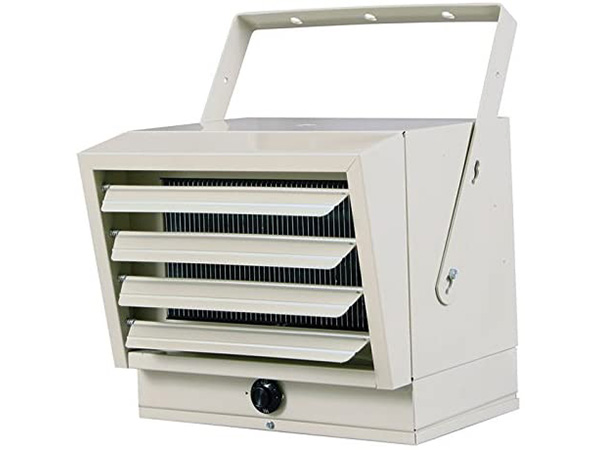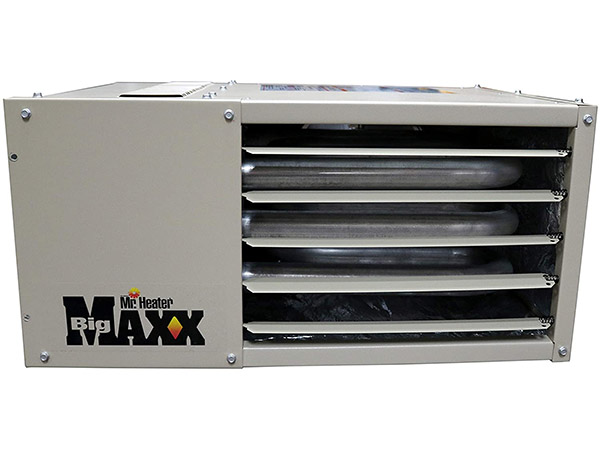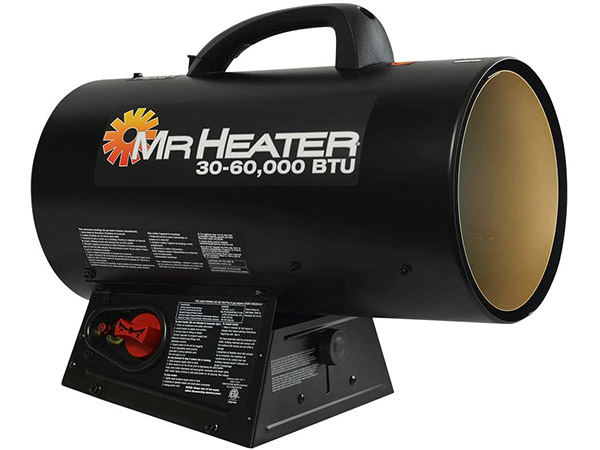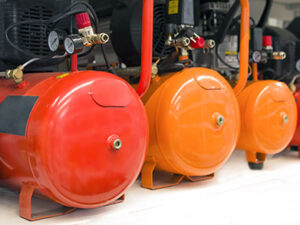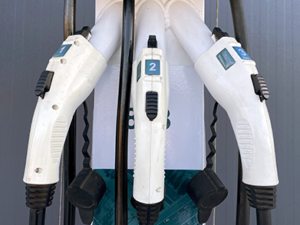Home \ Shop \ Automotive Garage \ Garage Heaters
The Best Garage Heaters in 2025 (For Garages That Fit 1-4 Cars)
Heating of the garage become better with cost-effective heater models, which can keep not only inner space heated, but also can save a money on fuel and service.
- 1. The Best Overall Garage Heaters
- 2. Fahrenheat Electric Garage Heater (FUH54)
- 3. Mr. Heater Big Maxx Natural Gas Heater (F260550)
- 4. Mr. Heater Portable Propane Forced Heater (MH60QFAV)
- 5. The Different Types Of Garage Heaters
- 6. What Is The Best Energy-Source For Garage Heater?
- 7. What Size Garage Heater Do You Need?
- 8. Key Features When Picking the Best Garage Heater
- 9. Safety Features to Look For in a Garage Heater
- 10. Other Useful Features Found On The Best Garage Heaters
- 11. The Best Garage Heater Brands
- 12. How many BTUs would it take to heat the garage?
- 13. What type of garage space heater is the best?
- 14. What type of garage heaters is the safest?
- 15. Can I use diesel oil instead of kerosene?
- 16. Can an outdoor heater be used inside the garage?
Whether replacing brake pads on your daily drive or working on the latest project car, time spent in your garage is mostly enjoyable: that is until winter sets in and temperatures plummet. Under these conditions you have two choices – you can either shelter in your warm home or warm up your garage using one of the best garage heaters on the market.
The problem is, with so many types on the market what should you go for? Do you go for the convenience of an electrical garage heater, or will a propane or natural gas powered unit be the best garage heater for you? And then there are the less common solutions such as kerosene or diesel fired heaters. Or, what about a heater that uses pellets. To make the task even more difficult there’s the question of cost. Not only the initial purchase price of the equipment, but also the cost of the energy to heat your work-space.
If you’re looking for the best garage heater on the market, here are three heaters we recommend:
The Best Overall Garage Heaters
PROS
- This energy efficient heater, compatible with 208 or 240 volts, is easy to use and cools down safely after switching it off
- Its heavy-duty functionality means it can warm up any outside or indoor space, with a ceiling or wall mount adding to the heater’s versatility
- This well respected company based in Bennettsville, South Carolina, has been producing energy-efficient heaters to the highest standards since 1986
CONS
- This heater is a little more expensive than others on the market, and running off electricity could also mean higher running costs
MAIN CHARACTERISTICS
BRAND
FahrenheatMODEL
FUH54CAPOWER SOURCE
ElectricHEAT OUTPUT
17000 BTUHEATS UP TO
400 sq. ft.PRICE RANGE
$400
When it comes to versatility the Fahrenheat FUH54 Electric Heater ticks all the boxes. Whether you are entertaining guests outdoors on the patio, or need to warm your garage without cluttering up your workspace, this heater equipped with a ceiling, or wall, mount does it all. To add to this versatility it also comes with a remote control so you can control it from a distance, while an automatic control function delays the fan until the heating element is warmed, thereby saving energy and money. And when the heater is running at full capacity, or you switch it off, a smart-circuit keeps the fan spinning so you don’t damage the 5,000W heating element. Using a built-in single pole thermostat, the element produces enough power to comfortably control the temperature from 45 to 135 degrees Fahrenheit.
PROS
- This heater is ideal for heating large spaces, with 50,000 BTU per hour it can heat up to 1250 sq. ft.
- A nice feature is the inclusion of a Natural Gas to Liquid Propane conversion kit and 2 angle brackets for a ceiling mount
- Founded in 1872, the Cleveland, Ohio-based company, has a reputation built around its extensive lineup of portable and permanent heaters
CONS
- Being a fossil-fuelled heater it requires venting, which is not included with the kit
MAIN CHARACTERISTICS
BRAND
Mr. HeaterMODEL
F260550POWER SOURCE
Propane/Natural gasHEAT OUTPUT
50,000 BTUHEATS UP TO
1250 sq.ft.PRICE RANGE
$500
If you’ve got a big 2- or 3-car garage, this heater’s for you. The built-in electric high velocity fan pulls cool air across a heat exchanger into the rear of the heater, before forcing the heated air into the work space. What’s more the Natural Gas to Liquid Propane conversion kit that comes with the heater, gives you a degree of flexibility to choose the fuel that works best for you in your area. And while it does require venting, the power exhaust enables you to choose vertical or horizontal venting. Often overlooked, one of the benefits of using a propane or natural gas heater is that it doesn’t require a high voltage electrical supply. So, the Mr. Heater Big Maxx MHU50NG only requires a standard 115V AC supply to power the fan and electric spark ignition.
PROS
- Obviously the major attraction of this forced air heater is its ability to deliver 60,000 BTU
- The fact that it is heavy duty and portable are bonuses
- The kit includes the L.P. Gas Hose and Regulator
- Founded in 1872, the USA-based company, is renowned for its extensive lineup of high quality, portable and permanent heaters
CONS
- Gas consumption is quite high, using up to 20 lbs in 14 hours on a low setting
MAIN CHARACTERISTICS
BRAND
Mr. HeaterMODEL
MH60QFAVPOWER SOURCE
PropaneHEAT OUTPUT
60,000 BTUHEATS UP TO
1500 sq.ft.PRICE RANGE
$270
The 60,000 BTU, Mr. Heater portable propane forced air heater is much more than just a garage heater. Its heavy-duty design also makes it ideal for use on construction sites, patios, factories, and at sporting events. Being portable all you have to do to get going, is plug the heater into a 115v outlet, connect the hose and regulator, included in the kit, to a 20-pound propane tank, and you’re ready to chase away the cold. With safety in mind, these heaters come with factory installed high limit switches and thermo-electric safety valves to prevent any accidents. And for everyone used to the jet-like roar of other forced air heaters, Mr. Heater quietens all their portable propane forced air heaters by way of the company’s Quiet Burner Technology that reduces noise by as much as 50 percent.
The Different Types Of Garage Heaters
There are a vast array of garage heaters on the market, all with unique features, advantages and disadvantages.
- Infrared heaters – the low-intensity infrared tube heater radiates infrared heat that directly warms people and objects, as opposed to warming the surrounding air. Because it first heats the people and objects before warming up the air, it takes a while to heat an entire work space.
- Radiant heaters – come in a range of sizes and consist of highly polished reflectors that direct heat into the garage. Portable or fixed, radiant heaters radiate a steady heat supply and are best suited to commercial workshops. An advantage of a radiant heater is that, because it doesn’t force air into the garage, it doesn’t blow any dust particles into the air.
- Fan heaters/space heaters/convection heaters – operate on the principle of convectional heating, to warm the air inside the garage by creating a convection flow that draws cold air in, through the bottom of the heater, with hot air rising out of the top. Forced-air convection heaters speed up the process using a fan to draw in cold air, while forcing out the hot air. Although these heat up the workspace quite quickly they are relatively noisy.
- Ceramic heaters – while these heaters are very similar to fan heaters, the electrical element is replaced by a ceramic heating element that produces more heat. Thus making them ideal for heating larger spaces.
- Quartz halogen heaters – these rely on metal reflector sheets and infrared radiation to direct the heat. These heaters have very similar properties to infrared heaters and are best suited for outdoor heating spaces and larger volumes.
- Propane/natural gas heaters – use natural gas rather than electrical power. Natural gas and propane fuelled heaters rely on a controlled flame to heat the air before it is channeled into the garage. Typically found in industrial applications these heaters can heat large volumes for extended periods at competitive costing.
NOTE: Garages that use natural gas or kerosene heaters must be well ventilated. If it does not, the garage will smell of fuel burning products.
- Pellet stove garage heaters – these heaters generate heat by burning wood pellets. The heat thus produced is distributed inside the work space by means of a heat powered fan. While bulky, they are quite cost-efficient to run.
- Free standing heaters – are portable and can be moved to where they are needed, thereby potentially saving on power.
- Wall or ceiling mounted heaters – while a portable heater is very handy, it does take up floor-space and can, at times pose a safety risk. By mounting the heater on the wall, or even the ceiling, you not only give yourself more room to work, but no longer run the risk of inadvertently knocking over the heater.
What Is The Best Energy-Source For Garage Heater?
Fuel cost and availability are vital in determining the running cost of the best garage heater. The list below gives you the specific heating energy, conversion efficiency, and an estimated cost per million BTUs by energy type. These costs will vary by state and season, and should therefore only be used as a comparative guide.
| FUEL | ENERGY CONTENT | HEAT CONVERSION EFFIENCY | COST PER MILLION BTU |
|---|---|---|---|
| Kerosene | 135000 BTU/gal | 85% | $23.97 |
| Fuel Oil | 139400 BTU/gal | 80% | $19.73 |
| Propane | 91600 BTU/gal | 85% | $34.04 |
| Natural Gas | 100000 BTU/therm | 85% | $14.71 |
| Electricity - Resistance | 3412 BTU/kWh | 100% | $32.24 |
| Electricity - Heat Pump | 3412 BTU/kWh | 200% | $16.12 |
| Coal | 13100 BTU/lb | 75% | $10.18 |
| Firewood - Hardwood | 24000000 BTU/cord | 60% | $13.89 |
| Wood Pellets | 8200 BTU/lb | 80% | $20.96 |
| Shelled Corn | 6970 BTU/lb | 75% | $13.66 |
Once you’ve established how many BTUs you will need to warm your garage and what running costs you can expect from the various energy sources, you’re ready to start evaluating the wide range of products available, in search of the best garage heater.
What Size Garage Heater Do You Need?
The most important factor in determining the size and type of garage heater you need is the size and construction of the garage you want to heat. So you need to know the size of your garage, type of insulation and expected winter temperatures in your region. Important to also take into consideration, is what type of fuel meets your cost, availability, and efficiency needs.
For a very quick estimate you can work on about 30 to 35 BTU per square foot for milder southern climates, and 55 to 60 BTU per square foot for colder, northern states. This is however, a VERY rough guesstimate, and you are better-off taking the time to refine your calculations, before consulting one of the many online BTU calculators to get a better, more accurate idea of your energy requirements. So, using the garage’s total volume, preferred garage temperature, and type of insulation will give you a more realistic outcome, when consulting the online calculator.
Obviously these factors are key in determining how much heat you will have to put into your garage to achieve a cozy temperature. For instance; if your insulation allows the heat to escape you will need more BTUs. Or if you expect temperatures below freezing you’ll also need to increase the size and/ or type of garage heater.
Once you have an idea of what sort of output your garage heater will need to deliver you will want to determine the projected running costs.
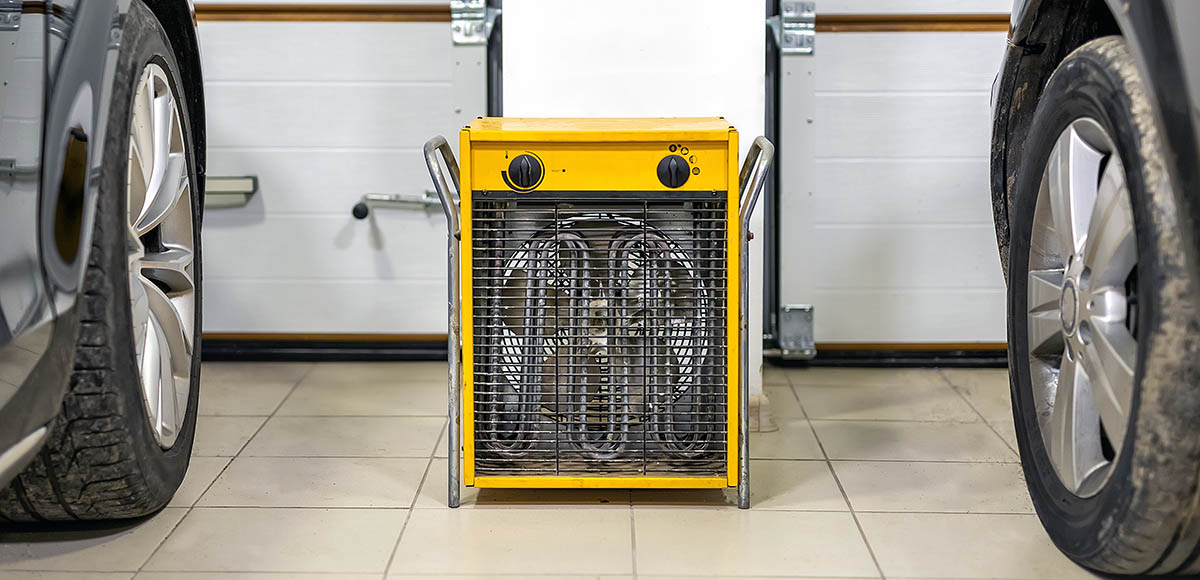
Key Features When Picking the Best Garage Heater
When looking for the best garage heater that will meet your requirements, you should first take into account the typical operating range of the most popular garage heaters:
- Electric heaters typically produce up to 6,000 watts or over 20,000 BTUs – just enough to warm a triple garage.
- Gas heaters can deliver between 4,000 and 30,000 BTUs.
- Propane garage heaters are capable of producing as much as 100,000 to 125,000 BTUs, making them more suited to larger industrial-sized garages.
Whatever the energy source, top-of-mind when introducing a garage heater into an environment that is probably poorly ventilated and likely contains flammable materials, must be safety.
Safety Features to Look For in a Garage Heater
These are some of the more important safety features that the best garage heaters should have:
- Overheat Protection – when operating the heater for an extended time it is possible for the heater to overheat. It is therefore important to have a safety mechanism that switches the heater off when the temperature becomes unsafe.
- Tip Over Mechanism – in a working environment it is quite easy to knock the heater over. In such an event, a heater equipped with a tip over mechanism will immediately switch off thereby preventing a fire.
- Visual safety warning system – to prevent users from burning their hands, the best garage heaters have a safeguard marker that turns red when heated.
And if the heater relies on any form of combustion – whether gas, kerosene, diesel propane, or pellets – ventilation of the toxic exhaust gasses is vital. This is also a key factor you need to consider when deciding on the best garage heater to meet your needs.
A fixed regulator on propane fuelled heaters is also an important safety feature. It allows you to easily turn off the gas supply when the heater is not in use, thereby reducing the risk of gas escaping.
Other Useful Features Found On The Best Garage Heaters
Although some of the features below might not apply to what you need in the best garage heater, we’ve compiled a list of the most common features that can come in handy:
- Coverage – while most heaters will rely on passive radiation or use a fan to increase the coverage, some garage heaters use louvers to direct hot air to where it is needed.
- Automatic temperature regulation – heaters with a built-in thermostat are able to control the room temperature to a pre-set value. This not only keeps the room at a cozy temperature, but can also save on energy consumption.
- Automatic starters – on gas, kerosene or propane heaters an automatic starter is very useful. The downside is that they require a separate electrical power source.
It doesn’t matter what the manufacturer claims in his advertising or what the specifications and features state – at the end of the day it all comes down to delivery. And the best way to ensure that the product lives up to the claims, is to stick with brands whose manufacturers have built up a solid reputation for delivering on their promises.
The Best Garage Heater Brands
These brands have a solid reputation for delivering quality products:
- Fahrenheat – has been the retail brand of heating products manufactured by Marley Engineered Products since 1986. Located in Bennettsville, South Carolina, the company is renowned for producing a range of energy-efficient products of the highest quality.
- Master Climate Solutions – as part of the Dantherm Group, Master manufactures fixed and portable heaters for applications ranging from large commercial shops to one-car garages. The company produces a line of quality heaters that covers forced air torpedo heaters and radiant infrared units, to electric fan heaters.
- Mr. Heater – founded in 1872, the Cleveland, Ohio-based company, has built up a reputation centered on its extensive lineup of portable and permanent heaters cold-weather, indoor and outdoor comfort.
- Dyna-Glo – is a product range manufactured by the GHP Group that specialize in electric fireplaces, electric log sets, and personal heating. In existence since 2003, Dyna-Glo markets an extensive line of consumer and commercial heaters. The company is well known for producing a range of quality heaters that covers everything from portable forced air kerosene heaters to wall mount radiant units.
After reading the guide to selecting the best garage heaters you may still have one or two unanswered questions, so we’ve included a few frequently asked questions below.
Having worked through this guide and taken heed of our product recommendations, all that is left to do is plugin your garage heater and enjoy your transformed workspace.
How many BTUs would it take to heat the garage?
For a very quick estimate you can work on about 30 to 35 BTU per square foot for milder southern climates, and 55 to 60 BTU per square foot for colder, northern states. But this is only a very rough estimate, and it is best to follow this guide to come up with a better value.
What type of garage space heater is the best?
This depends on the size and construction of the garage: For smaller spaces that are quite well insulated, electric fan or ceramic heaters will work well, whereas large commercial-size garages may require a propane or kerosene heater. We cover this in more detail in the guide, above.
What type of garage heaters is the safest?
While any heated surface poses a safety concern, electrical heaters do not have to deal with the toxic fumes emitted when combusting fuels such as propane, gas or kerosene, and are therefore, in some aspects, safer.
Can I use diesel oil instead of kerosene?
Yes you can, but you do run the risk of contaminating the wick. If you want to use diesel it’s best to use a number 1 diesel, which is a good substitute for kerosene as it doesn’t have any aromatic compounds and burns cleanly.
Can an outdoor heater be used inside the garage?
Yes, it is possible, as long as all the safety protocols are followed. However fossil-fuelled heaters designed for outdoor use should not be used in an unventilated garage enclosure. With these types of heater it is best to follow the manufacturer’s warnings/instructions.
We do an efforts to find, research and recommend the best products. So, we may receive commissions from purchases that you make after following the links in our product reviews.
Related Products
-

Best Air Compressors For Home Garage Use in 2025 (Review)
-

Best Car Phone Mounts and Holders for Convenient Use in 2025
-

3 Best Shock Absorbers for Smooth and Precise Driving in 2025
-

Best Electric Vehicle Chargers For Home (TOP Products Review and Buyer’s Guide)
-

Best Windshield Wipers and Wiper Blades Shortlisted in 2025


